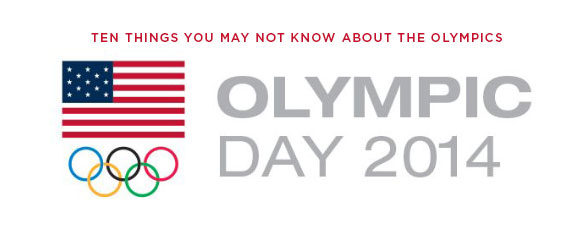Happy Olympic Day! Every year on June 23, Olympic Day commemorates the birth of the modern Olympic Games. The event was first introduced in 1948 and was established to help promote the Olympic Values and participation in sport across the world. More than 160 countries around the globe take part in the celebration.
In the U.S., Olympic Day events range the gamut from small to large events. Find out what Olympic Day Events happening in your area and how you can participate.
Test your Olympic knowledge in this true or false quiz. The quiz is targeted for children 12-13 years old however I’d guess most adults wouldn’t score 100%.
TRUE OR FALSE OLYMPIC QUIZ
Q1 – Each colour of the Olympic rings represents a particular continent.
False – This is a misconception. In reality, the rings represent the union of the five continents and the coming-together of the whole world’s athletes at the Olympic Games. As for the colours of the flag, they were chosen because at least one of them (blue, black, red, yellow, green and white) can be found in each national flag.
Q2 – One of the missions of the Olympic Movement is to promote peace in the world.
True – “The goal of Olympism is to place sport at the service of the harmonious development of humankind, with a view to promoting a peaceful society concerned with the preservation of human dignity.†This is the second of the six Fundamental Principles of Olympism set out in the “Olympic Charterâ€, the document which governs the organisation, actions and functioning of the Olympic Movement.
Q3 – The Games host city is chosen in a draw from among the candidate cities.
False – The IOC members elect the Olympic Games host cities with an absolute majority (i.e. half the votes plus one). This happens seven years before the Games are held, at a meeting called the Session. Custom dictates that the IOC President does not take part in the vote.
Q4 – The Olympic Anthem was written by Rod Stewart, a 1980s singer.
False – The music was composed by Spiros Samaras and the words were written by Costis Palamas. The Olympic Anthem was played for the first time in 1896, at the Opening Ceremony of the first modern Olympic Games. It was later replaced by several other musical compositions (but none by Rod Stewart). It was only in 1955 that it finally became the official anthem.
Q5 The Olympic motto – CITIUS ALTIUS FORTIUS – means “Proud, tall, strongâ€.
False – The three Latin words mean “faster, higher, strongerâ€. These three words encourage the athlete to give the best of himself during competition. To better understand the motto, we can compare it to the Olympic saying: “The important thing in life is not the triumph but the struggle, the essential thing is not to have conquered but to have fought well.â€
Q6 – Ice hockey and figure skating were on the Summer Games programme.
Neither true nor false – Skating was on the programme of the 1908 Games and ice hockey from 1920. At this time, there was no distinction between the winter and summer Games and the events could be staged over several months. It was only from 1925 that the IOC officially decided to separate the two events.
Q7 – Pierre de Coubertin, reviver of the Games, took part in the Games under a false name.
True – His “Ode to Sport†entered under a pseudonym for the Stockholm (1912) Olympic Games, won him first prize in the Art and Literature Contest, an event on the programme at the time.
Q8 – 50kg stone-lifting was on the Olympic programme.
True – It was part of the gymnastics all-round event in 1900, as was rope climbing and the pole vault! Sports, disciplines and events… the Games programme is continuously updated. Today, the Summer Games comprises 26 sports and the Winter Games seven. In the selection criteria it is specified that only sports that apply the World Anti-Doping Code can be included or remain on the program me.
Q9 – London is the only city to have hosted three Olympic Games.
True – London hosted the Olympic Games in 1908, 1948 and 2012. Six other cities have hosted the Games twice: Athens (1896 and 2004), Paris (1900 and 1924), St Moritz (1928 and 1948), Lake Placid (1932 and 1980), Los Angeles (1932 and 1984) and Innsbruck (1964 and 1976).
Q10 – The marathon was on the programme of the Olympic Games of Antiquity.
False – The marathon was not staged at the Games in Antiquity. This race was created for the Athens Games in 1896 to commemorate the legend of the Greek soldier who, in 490 BC, ran from Marathon to announce to the people of Athens the military victory over Persia (distance: about 34.5km). At the London 1908 Games, the distance of the race was extended, from 25 to 26.2 miles (42.195km), so that it could end in front of the Royal Box. This distance then became the standard for the marathon event and has remained so until today.
Quiz and information via olympicday.fusesport.com (PDF)

